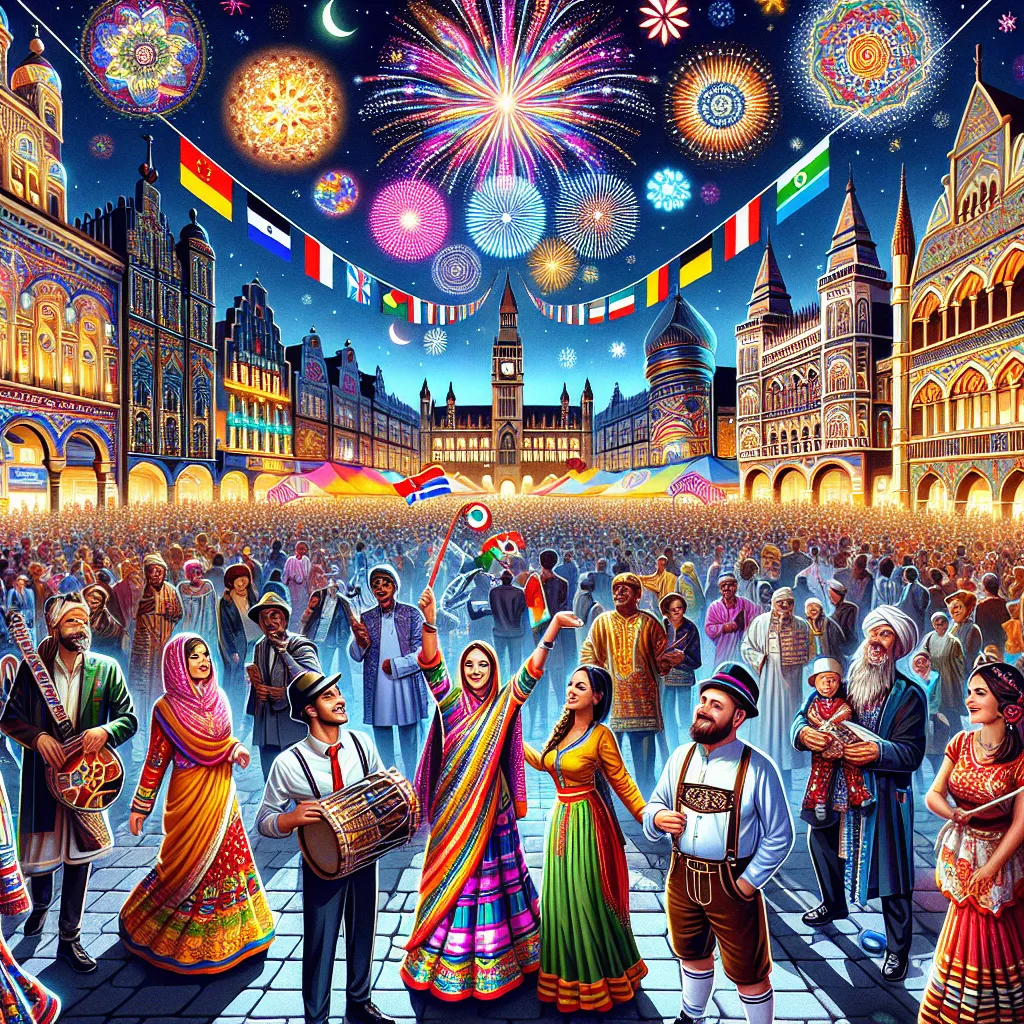The IELTS Speaking test often includes questions about festivals and cultural celebrations, particularly in Part 2 and Part 3. “Describe a famous festival celebrated in your region” is a common topic that candidates may encounter. This article will provide valuable tips and sample answers to help you excel in this topic and boost your IELTS Speaking score.
Understanding the Task
Before we dive into the sample answers, let’s break down what the examiner is looking for when asking about a famous festival in your region:
- Detailed description of the festival
- Cultural significance and history
- Personal experiences and opinions
- Fluency and coherence in your response
- Appropriate use of vocabulary and grammar
 Colorful festival celebration
Colorful festival celebration
Part 1: Introduction and Interview
In Part 1, you may be asked general questions about festivals. Here are some potential questions and sample answers:
Q: Do you enjoy festivals?
Band 6-7 Answer:
Yes, I do enjoy festivals. They’re usually fun and exciting. I like the atmosphere and the chance to celebrate with friends and family.
Band 8-9 Answer:
Absolutely! I’m quite enthusiastic about festivals. They offer a wonderful opportunity to immerse myself in cultural traditions and create lasting memories with loved ones. The vibrant atmosphere and sense of community during festivals are truly invigorating.
Q: What’s your favorite festival?
Band 6-7 Answer:
My favorite festival is Diwali. It’s the festival of lights in India. I love the colorful decorations and the fireworks. It’s a time when families get together and celebrate.
Band 8-9 Answer:
I’m particularly fond of Diwali, the festival of lights celebrated across India. It holds a special place in my heart due to its profound cultural significance and the way it brings people together. The dazzling array of lights, intricate rangoli designs, and the joyous atmosphere make it a truly spectacular event that I look forward to each year.
Part 2: Long Turn (Cue Card)
Here’s a sample cue card related to describing a famous festival:
Describe a famous festival celebrated in your region
You should say:
- What the festival is called
- When it is celebrated
- What people do during this festival
- And explain why this festival is important to people in your region
Sample Answer (Band 6-7):
The festival I’d like to talk about is Holi, which is a famous festival in India. It’s also known as the Festival of Colors. Holi is usually celebrated in March, marking the arrival of spring.
During Holi, people throw colored powders and water at each other. It’s a very fun and exciting time. Everyone gets covered in different colors. People also eat special sweets and snacks during this festival.
Holi is important because it brings people together. It’s a time when everyone forgets their differences and joins in the celebrations. The festival also has religious significance for Hindus, as it represents the victory of good over evil.
I remember celebrating Holi with my friends last year. We had a great time playing with colors and eating delicious food. It was a day full of laughter and joy.
Sample Answer (Band 8-9):
I’d like to describe Holi, a renowned festival celebrated in India, also known as the Festival of Colors. This vibrant celebration typically takes place in March, heralding the arrival of spring and the end of winter.
The hallmark of Holi is the exuberant throwing of colored powders and water. People from all walks of life take to the streets, dousing each other in a kaleidoscope of hues. The air is filled with laughter and joy as everyone becomes a walking canvas of colors. Traditional delicacies such as gujiya and thandai are savored during this time, adding to the festive atmosphere.
Holi holds immense importance in our region for several reasons. Firstly, it serves as a powerful symbol of unity, transcending social barriers and bringing people together in a spirit of camaraderie. The festival also has deep religious significance for Hindus, commemorating the triumph of good over evil as depicted in ancient legends.
Moreover, Holi marks a time of renewal and forgiveness, allowing people to mend relationships and start afresh. The vivid colors used in the celebrations are emblematic of the vibrancy and diversity of Indian culture.
I have fond memories of celebrating Holi last year with my friends and family. The sheer joy of playfully throwing colors, the melodious sound of traditional songs, and the warmth of community spirit made it an unforgettable experience. It truly epitomizes the essence of Indian festivals – a perfect blend of tradition, joy, and togetherness.
Follow-up Questions:
- How has the celebration of this festival changed over the years?
- Are there any environmental concerns related to this festival?
- How do young people and older generations differ in their approach to celebrating this festival?
Part 3: Two-way Discussion
In Part 3, the examiner will ask more abstract questions related to festivals and celebrations. Here are some potential questions and sample answers:
Q: How do festivals contribute to a country’s cultural identity?
Band 6-7 Answer:
Festivals are important for a country’s cultural identity. They show the traditions and values of a country. Festivals help people remember their history and keep customs alive. They also attract tourists who want to learn about different cultures.
Band 8-9 Answer:
Festivals play a pivotal role in shaping and preserving a country’s cultural identity. They serve as living repositories of traditions, values, and collective memory. By actively participating in these celebrations, people reaffirm their connection to their cultural roots and pass on important customs to younger generations.
Moreover, festivals often showcase a country’s unique artistic expressions, such as music, dance, and traditional crafts. This cultural showcase not only reinforces national pride but also attracts international attention, promoting cultural exchange and tourism. In essence, festivals act as cultural ambassadors, offering a window into the soul of a nation and fostering a sense of shared identity among its people.
Q: Do you think globalization is affecting traditional festivals?
Band 6-7 Answer:
Yes, I think globalization is affecting traditional festivals. Some festivals are becoming more commercialized. People are adopting celebrations from other cultures too. However, many people still try to keep their traditional festivals alive.
Band 8-9 Answer:
Globalization has indeed had a profound impact on traditional festivals, resulting in both positive and negative consequences. On one hand, it has led to the homogenization of certain celebrations, with some festivals becoming increasingly commercialized and losing their authentic essence. The influx of global brands and marketing strategies has, in some cases, overshadowed the cultural significance of these events.
However, globalization has also facilitated cultural exchange, allowing people to experience and appreciate festivals from different parts of the world. This cross-pollination of ideas has sometimes revitalized traditional celebrations, infusing them with new elements while retaining their core values.
Interestingly, the threat of cultural dilution has also sparked a renewed interest in preserving and promoting traditional festivals. Many communities are now making concerted efforts to maintain the integrity of their cultural celebrations, seeing them as a way to assert their unique identity in an increasingly interconnected world.
Key Vocabulary and Phrases for High Scores
To achieve a high score in IELTS Speaking, it’s crucial to use a wide range of vocabulary and complex sentence structures. Here are some words and phrases that can help elevate your responses:
-
Vibrant /ˈvaɪbrənt/ (adjective): Full of energy and life
Example: The festival creates a vibrant atmosphere in the city. -
Commemorate /kəˈmeməreɪt/ (verb): To remember and show respect for an important event or person
Example: This festival commemorates the country’s independence. -
Traditions /trəˈdɪʃənz/ (noun): Long-established customs or beliefs
Example: Our festival is steeped in ancient traditions. -
Cultural significance /ˈkʌltʃərəl sɪɡˈnɪfɪkəns/ (noun phrase): The importance of something in a culture or society
Example: Diwali holds great cultural significance for Hindus worldwide. -
Festive atmosphere /ˈfestɪv ˈætməsfɪər/ (noun phrase): A joyful and celebratory mood
Example: The streets are filled with a festive atmosphere during the carnival.
Tips from an IELTS Speaking Examiner
As an experienced IELTS Speaking Examiner, here are my top tips for excelling in this part of the test:
- Practice regularly: Familiarize yourself with common topics and practice speaking about them fluently.
- Develop your vocabulary: Learn and use a wide range of words and phrases related to festivals and celebrations.
- Use personal examples: Incorporate your own experiences to make your answers more authentic and engaging.
- Structure your answers: Organize your thoughts logically, especially in Part 2’s long turn.
- Listen carefully: Pay attention to the examiner’s questions and answer them directly.
- Speak naturally: Aim for a conversational tone rather than sounding rehearsed.
- Show enthusiasm: Demonstrating interest in the topic can positively impact your fluency and pronunciation scores.
Remember, the key to success in IELTS Speaking is not just about knowing what to say, but how to say it effectively and naturally.
For more IELTS Speaking practice, you might find these related topics helpful:
- Describe a famous chef from your country
- Describe a place in your country that is known for its food
By following these tips and practicing regularly, you’ll be well-prepared to discuss festivals and other cultural topics in your IELTS Speaking test. Good luck with your preparation!


